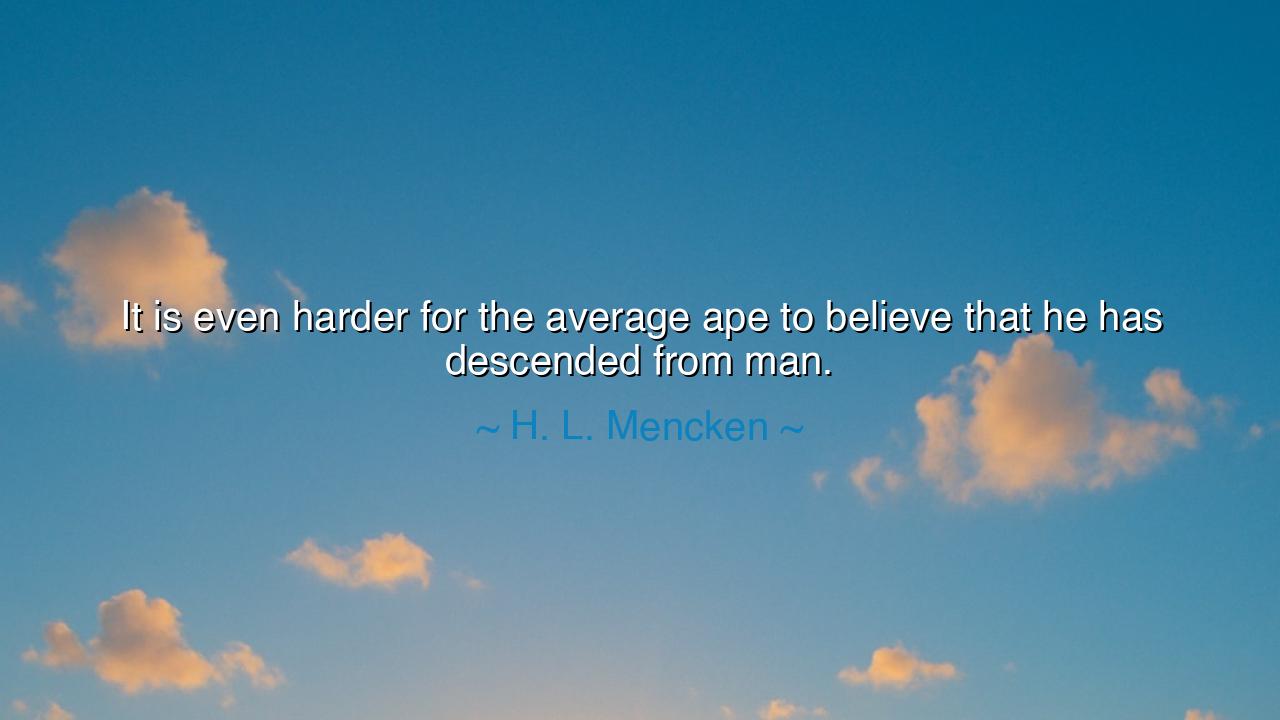
It is even harder for the average ape to believe that he has






“It is even harder for the average ape to believe that he has descended from man.” — with this blade of irony, H. L. Mencken, the great satirist of human folly, turned the mirror upon our species. His words shimmer with laughter, yet beneath the jest lies a truth both humbling and cruel: that man, in his arrogance, often behaves more foolishly than the creatures he claims to surpass. Mencken, with the wit of an ancient philosopher and the sharpness of a cynic, sought to awaken us from our self-worship — to remind us that progress in body does not always mean progress in spirit.
The surface humor of the quote comes from inversion. Science teaches that man has evolved from the ape, yet Mencken suggests the reverse: that were the ape to look upon mankind, he would be too proud to claim such descent. Beneath the jest lies a stinging truth — that human beings, for all their intellect and civilization, often act with less wisdom, less compassion, and less dignity than the animals they presume to rule. The average ape, he implies, would look upon human wars, greed, and hypocrisy and recoil in disbelief that such chaos could have issued from nature’s hand.
Mencken’s irony carries the tone of the ancients — like Diogenes, the Greek cynic who walked the streets of Athens by daylight with a lantern, seeking an honest man. He too mocked the pretensions of society, exposing the gap between what men claimed to be and what they truly were. Mencken, writing in the modern age, carried that same torch — a moral flame disguised as laughter. His quip reminds us that the greatest blindness of humanity is not ignorance of science, but ignorance of humility.
History offers us countless scenes that prove Mencken’s point. Consider the First World War, a time when nations armed with reason and education plunged the world into madness. The ape in the forest kills only to eat or defend; man, the supposed pinnacle of evolution, kills for ideology, pride, and glory. Mencken, who lived through that era, saw that intelligence without wisdom is more dangerous than ignorance itself. Thus, in jesting that the ape would refuse to claim us, he exposed a deep wound in civilization — that progress in tools does not guarantee progress in morals.
There is also tenderness in his irony, a sorrow hidden beneath the laughter. For what he mocks, he also mourns. Mencken loved the human spirit — its brilliance, its creativity, its wild potential — but he despaired at its misuse. To him, the tragedy of man was not that he came from the ape, but that he forgot how to be noble in simplicity, how to live with the harmony and instinctive integrity that even beasts possess. The ape’s disbelief, then, becomes a symbol of nature’s disappointment in her most ambitious child.
Yet this quote is not without hope. Like the satirical poets of old — Horace, Juvenal, and Swift — Mencken believed that laughter could purify. In recognizing our own absurdity, we reclaim our sanity. When we can laugh at our vanity, we begin to see clearly. To admit that an ape might judge us harshly is to acknowledge that we have strayed from our natural wisdom — and that we may still find our way back through self-awareness, humility, and compassion.
The lesson is thus twofold: first, to remember that intellect without conscience leads only to ruin; and second, that the measure of humanity is not found in dominance, but in dignity. The ape kills no forests for profit, wages no wars for pride. If we would be greater than our origins, we must act with the responsibility that comes with power — not with arrogance, but with stewardship.
So, my listener of the future, take Mencken’s jest as a sacred mirror. Laugh at it, yes — but also learn from it. Let the ape’s imagined scorn awaken in you a nobler form of being. For the true ascent of man is not measured by how far he has risen above the animal, but by how deeply he has remembered his place within creation — not as a master of life, but as its humble keeper. Only then, perhaps, would even the average ape nod in approval and say, “Yes, these are truly my descendants.”






AAdministratorAdministrator
Welcome, honored guests. Please leave a comment, we will respond soon